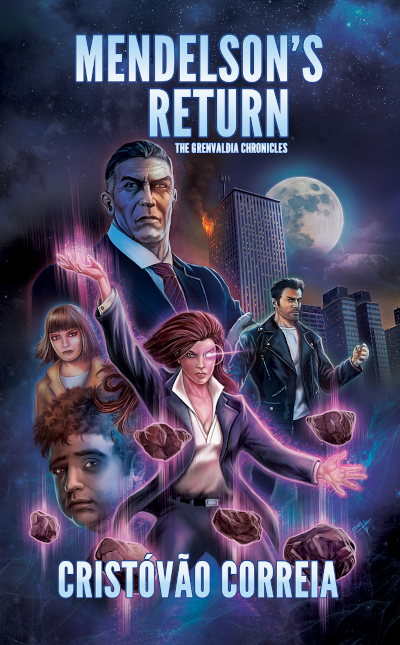SPSFC 4 Review: Mendelson's Return

The first novel I've finished reading for the fourth Self-Published Science Fiction Competition (SPSFC) is Mendelson's Return by Cristóvão Correia. My team Ground Control to Major Tom is trying a different method this time around to determine which of our 32 allocated books should become our six quarterfinalists. Instead of having all seven judges sample 10-20 percent of each book, we've divided the novels so that two judges give each book a full read before deciding whether to recommend it to the rest of the team.
Mendelson's Return is a superhero novel, a subgenre of science fiction that appeals to me as a comics fan. It's about a small group of people called The Gifted who have specific powers like psychokinesis, energy transfer and speed. They don't wear tights and fight crime. Instead they try to stay alive in an ongoing war between three shadowy groups that want to either exploit them or destroy them.
The novel begins with a chase scene that lasts until the halfway point of the book. An observation I've made at times when reading for SPSFC is that a book is taking too long for something to happen. That's not the case here but it may be too much of a good thing.
There are a half-dozen primary characters who are members of the Gifted or their normie friends. I had trouble developing a rooting interest in the protagonists while the long life-and-death chase unfolded across modern Portugal. Most of the propulsive force of the story is recounting the action beat by beat, leaving little opportunity to get to know the characters beyond the occasional aside about their back stories.
The characters who best caught my interest were Heitor and his best friend Eric -- one a square-jawed Gifted hero and the other a non-powered comic shop clerk with no idea the world resembles his four-color fantasies. Their friendship is a simple hook that leans hard on Eric being schlubby and Heitor looking out for him, but I became invested.
While Eric is at the forefront of the story, he serves a useful purpose as the character who gets to learn about the super-powered world and have a psychobilly freakout. Things get weirder later for Eric in a way I won't spoil.
The second half of the novel brings together a protagonist and the powerful relative she's been estranged from for seven years. I was hoping for a detailed character-driven interlude where we learn why the world had become an all-out war of absolute savagery between the groups. Instead a short pause is followed by a many-chapter climactic battle with a huge number of deaths.
This is the start of a series with additional books yet to be released. The end appears to be a table setter for the next book rather than a distinct conclusion.
The visual nature of comic books lends itself to all-out action, but when turned into a novel, it's essential to care about the characters beyond their need to survive to the next page.
Add a Comment
All comments are moderated before publication. These HTML tags are permitted: <p>, <b>, <i>, <a>, and <blockquote>.

